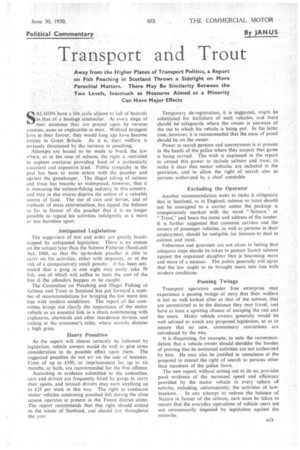Transport and Trout
Page 75

If you've noticed an error in this article please click here to report it so we can fix it.
Political Commentary By JAN US
Away from the Higher Planes of Transport Politics, a Report on Fish Poaching in Scotland Throws a Sidelight on More Parochial Matters. There May Be Similarity Between the Two Levels, ' Inasmuch as Measures Aimed at a Minority
Can Have Major Effects
SALMON ALMON have a life cycle almost as full of hazards .is that of a haulage contraCtor. At every stage of their existence they are preyed upon by various enemies, none so implacable as man. Without stringent laws in their favour, they would long ago have become extinct in Great Britain. As it is, their welfare is seriously threatened by the increase in poaching.
Attempts are bound to be made to break the law _where, as in the case of salmon, the right is restricted to capture creatures providing food of a particularly succulent and expensive kind. Public sympathy in the past has been to some extent with thc poacher and against the gamekeeper. The illegal taking of salmon and trout has become so widespread, however, that it is menacing the salmon-fishing industry in this country, and may in due course deprive the nation of a valuable source of food. The use of cars and lorries, and of methods of mass extermination, has tipped the balance so far in favour of the poacher that it is no .longer possible to regard his activities indulgently as a more or less harmless sport.
Antiquated Legislation The supporters of law and order are greatly handicapped by antiquated legislation. There is no statute on the subject later than the Salmon Fisheries (Scotland) Act, 1868, so that the up-to-date poacher is Able to carry on his activities, either with impunity, or at the risk of a comparatively small penalty. It has been estimated thata gang in one night may easily take 50 fish, one of which will suffice to meet the cost of the fine if the offenders happen to be caught.
The Committee on Poaching and Illegal Fishing of Salmon and Trout in Scotland has put forward a number of recommendations for bringing the law more into line with modern conditions. The report of the committee brings out clearly the importance of the motor vehicle as an essential link in a chain commencing with explosives, chemicals and other murderous devices, and ending at the consumer's table, where scarcity dictates a high price.
Heavy Penalties As the report will almost certainly be followed by legislation, vehicle owners would do well to give some consideration to its possible effect upon them. The suggested penalties do not err on the side of lenience. Fines of up to £100, or imprisonment for up to six months, or both, are recommended for the first offence.
According to evidence submitted to the committee, cars and drivers are frequently hired by gangs to carry their spoils, and taxicab drivers may earn anything up to £25 per week in this way. The right to confiscate motor vehicles containing poached fish during the close season operates at present in the Tweed district alone. The report recommends that this right should extend to the whole of Scotland, and should last throughout the year.
Temporary de-registration, it is suggested, might be substituted for forfeiture of such vehicles, and there should be safeguards where the owner is unaware of the use to which his vehicle is being put. In the latter case, however, it is recommended that the onus of proof should be on the owner.
Power to search persons and conveyances is at present in the hands of the police where they suspect that game is being carried. The wish is expressed in the report to extend this power to include salmon and trout, to make it clear that motor vehicles are included in the provision, and to allow the right of search also to persons authorized by a chief constable.
Excluding the Operator • . .
Another recommendation seeks to make it obligatory that in Scotland, as in England, salmon or trout should not be consigned to a carrier unless the package is conspicuously marked with the word "Salmon" or "Trout," and bears the name and address of the 'sender. it is further suggested .that common carriers and the owners of passenger vehicles, as well as persons in their employment, should be ineligible for licences-to deal in .salmon and trout.
Fishermen and gourmets are not alone in feeling that adequate steps should be taken to protect Scotch salmon against the organized slaughter that is becoming more and more of a menace.The public generally will agree that the law ought to be brought more into line With modern conditions.
Passing Twinge
Transport operators under free enterprise may experience a passing twinge of envy that their welfare is not so well looked after as that of the salmon, that are unrestricted as to the distance they may travel, and have at least a sporting chance of escaping the rod and the snare. Motor vehicle owners generally would be well advised to watch any proposed legislation, so as to ensure that no new, unnecessary restrictions are introduced by the way.
It is disquieting, for example, to note the recommendation that a vehicle owner should shoulder the burden of proving that its nocturnal activities are not authorized by him. He may also be justified in uneasiness at the proposal to extend the right of search to persons other than members of the police force.
The new report, without setting out to do so, provides good evidence of the increased speed and efficiency provided by the motor vehicle in every sphere of activity, including, unfortunately, the activities of law
breakers. In any attempt to redress the balance of Nature in favour of the salmon, care must be taken to ensure that the everyday operations of vehicle users are not unnecessarily impeded by legislation against the. minority.




























































































































